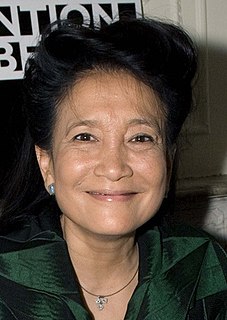A Quote by Jung Chang
I like to have Chinese furniture in my home as a constant and painful reminder of how much has been destroyed in China. The contrast between the beauty of the past and the ugliness of the modern is nowhere sharper than in China.
Related Quotes
I've been in China enough to know that you shouldn't opine on it unless you speak Chinese and have lived there for twenty years. I wasn't pretending to be a China expert in that final chapter. I was just pointing, first to the parallels between Chinese behavior toward us and ours toward GB when we were at the same stage of development, and secondly to how much harder their development path is than ours was.
My father has always been interested in discarding the past. He's never much liked China or the whole idea behind China or Chinese ways of thinking. He's always been much more attracted to American ways of thinking. He feels Americans are more open - they tell you what they think - and he's very much that way himself.
China need to be fought back on. And what we need to do is go at the things that they are most sensitive and most embarrassing to them; that they're hiding; get that information and put it out in public. Let the Chinese people start to digest how corrupt the Chinese government is; how they steal from the Chinese people; and how they're enriching oligarchs all throughout China.
The most successful hyperpowers are the ones where there was actual intermixing. Tang dynasty China was China's golden age, and contrary to what I was told when I was growing up, Tang China was founded by a man who by today's standards was no more than half Chinese. It was a mixed-blood dynasty that pulled in 'barbarians' from the steppe.
I was used on a number of occasions by the United States and China as a conduit. For instance, I was up there talking with the Chinese leadership and they said to me that they were a bit concerned that the Americans had a misunderstanding about their relationship with the Soviets. There was some suggestion that there was a rapprochement developing between China and the Soviets, but nothing could have been further from the truth.
The great crime which the moneyed classes and promoters of industry committed in the palmy Victorian days was the condemning of the workers to ugliness, ugliness, ugliness: meanness and formless and ugly surroundings, ugly ideals, ugly religion, ugly hope, ugly love, ugly clothes, ugly furniture, ugly houses, ugly relationship between workers and employers. The human soul needs actual beauty more than bread.
In China, your freedom is always limited, but this limitation applies to almost everyone. If someone does injustice to you, though, you have to find a way to avenge yourself - even by illegal measures. In a sense, injustice is more personal. This idea has always been in Chinese history. I think we read about freedom of speech, or lack of freedom of speech, in China so often. But I don't think people here in America think about how justice, or the idea of justice, is so important in a Chinese setting. It's probably more important than freedom of speech in the Chinese mindset at this moment.
There are a lot of Chinese-American designers and Chinese designers who have had an impact a little bit on the American market, but I think it's going to be interesting to watch if, over time, somebody can emerge from China who is based in China, and whether they come and show in Paris, like Rei Kawakubo or Yohji Yamamoto did.






































